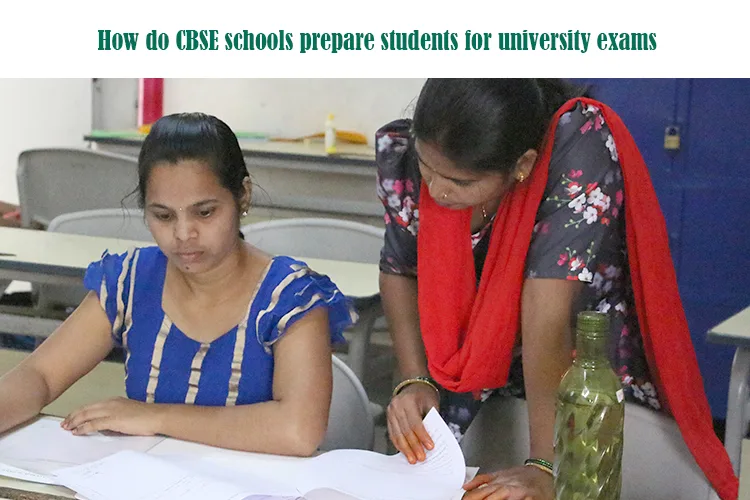CBSE schools in India focus on student-centric learning. They are known for their academic intensity and complete pedagogy. The teaching in a CBSE school like DPS Warangal is beyond merely finishing the textbook syllabus. The process involves grooming students to acquire conceptual understanding, develop critical thinking, and prepare for examinations so that students are able to compete nationally and internationally with the very best students of universities.
Here is how CBSE schools provide a smooth transition to their students for higher education, right from content used in school, which is aligned to NCERT, to career counseling.
1. Laying a Strong NCERT-Aligned Academic Foundation
Pre-primary schools across India pride themselves in being feeder schools for CBSE schools also, which are often heralded for inculcating foundational or basic knowledge in the core subjects of Mathematics, Sciences, and Languages. The syllabus is NCERT based, which goes hand in hand with competitive exams like JEE, NEET, and CUET, so the students learn and retain concepts that will prove useful for college entrance tests.
The syllabus is updated now and then so that it stays abreast of new knowledge and real-world advancements. Unit tests are conducted regularly; formative assessments take place; mid-year reviews are also done that take stock of where the students are. On this basis, remedial sessions may be conducted if needed.
2. Conceptual Learning and Critical Thinking Skills
Unlike rote memorization, the pattern of education that CBSE has adopted is such that it tries to make students learn the ‘why’ behind every concept. The curriculum is built around practical-work, subject-related projects, lab experiments, and real-world applications that build on a deeper understanding of the concept for long-term retention.
The assignments are designed to encourage students to think, analyze, interpret, or apply the concept as well as foster the development of critical thinking, as it would be required for any form of higher studies. This very basis enables the student to confidently attempt analytical ones in entrance exams or university assessments.
3. Continuous and Comprehensive Evaluation (CCE)
CBSE schools have to adopt a model that gives a holistic view of assessment-the continuous and comprehensive evaluation system. According to the CCE system, a student is evaluated on a continuous basis through quizzes, assignments, practicals, and periodic tests throughout the academic session, rather than a single final examination.
This continuous evaluation allows teachers to realize learning gaps earlier and tailor intervention in a one-on-one manner. As students learn how to manage time and pick up apt studying styles, they are able to forge ahead in small increments. These are all vital grounds for a student to survive in the self-pace learning set-up of universities.
4. Focused Coaching for Competitive Exams
Further coaching modules and after-school selection classes are imparted in several CBSE schools, including DPS Warangal, for JEE, NEET, CUET, and Olympiads.
Regular mock exams and timed assessments help simulate the real test environment, creating the required exam temperament and thereby reducing anxiety. Schools also motivate students to take part in national and international talent contests to bolster academic endurance and confidence.
Online resources and sample question papers (SQPs) and question papers of previous years issued by the CBSE are employed in the performance enhancement process.
5. Career Counseling and Future Planning Support
Choosing a university or career stream is an overwhelming decision for students and parents. That is why CBSE schools do provide students with a framework of career guidance and counseling programs from Class 9 onwards.
Dedicated counselors help students select their courses, apply to universities, assist with scholarships, and carry out planning for entrance examinations. Students are encouraged to explore their interests through aptitude tests and personality assessments. Additional support is available to girls undertaking STEM fields through initiatives like CBSE UDAAN, aiming toward inclusive academic pathways.
6. Global Exposure and International Opportunities
CBSE credentials are accepted worldwide by universities. Emphasizing holistic development and a good academic foundation, the Board tries to make its candidates competitive for foreign institutions.
Several CBSE schools make foreign language electives, student exchange programs, and international collaboration projects available. Such exposure to global contests and Model UN frameworks further fortifies their cross-cultural communication and worldview.
7. Creating a student-centric and supportive learning environment
CBSE schools focus not just on academic performance but on the emotional and social well-being of students. At DPS Warangal, teaching strategies are adapted to suit diverse learning styles making classrooms more engaging and inclusive.
Extracurricular activities such as sports, music, dance, and theatre are integral to daily life. It helps students develop teamwork, leadership, and emotional intelligence. Counseling support, peer mentoring, and teacher involvement make sure students feel heard and supported.
Importantly, schools conduct wellness workshops and time management sessions to help students handle stress, an essential part of university readiness.
At DPS Warangal, we act as launchpads for university success. By combining structured academics with skill development, mentoring, and personalized support, these schools help students not only perform in exams but thrive in life.
Whether aiming for IITs, AIIMS, global universities, or entrepreneurship, the CBSE ecosystem empowers students with the tools, mindset, and resilience to lead their future.


